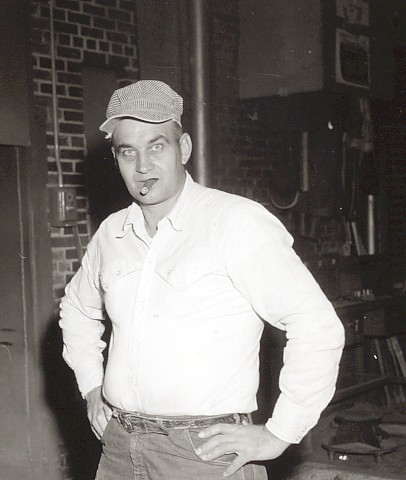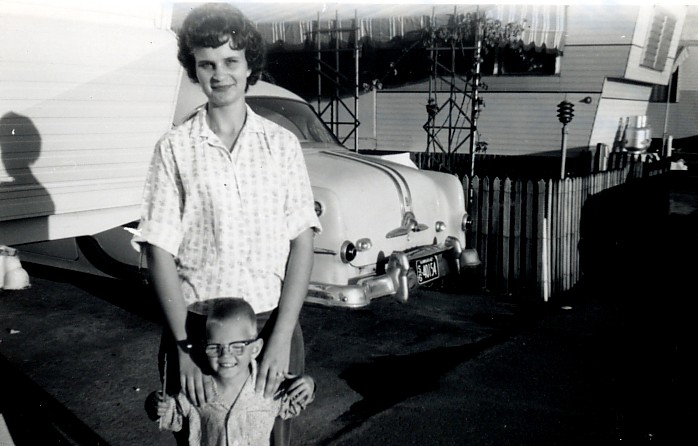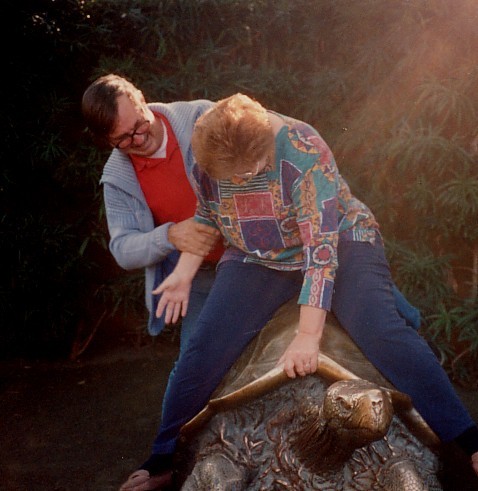Mary J. Briskey (nee Cantrell)


Just a little Taste!
| Mary J. Briskey (Cantrell) was born on Sept. 3, 1940 to Arthur and Irene Cantrell. Mary grew up in Wichita Kansas with one brother and one stepsister. Mary's mother died when Mary was younger, and Arthur worked as a molder molding airplane parts. Mary married Edward Lee Briskey Sr. on Sept. 28, 1956 at St. Ann's Catholic Church in Wichita Kansas. She has three children, Edward L. Briskey Jr., David Allen Briskey, and Diana Kliner, and six grandchildren, all but one of which are boys. |  |

|
Mary lived on a small farm growing up and used to collect eggs from the hens as part of her chores. She was married at the age of 16 to my grandfather who then became a sailor in the United States Navy. Mary has traveled around the country as a military spouse while raising her three children, and eventually ended up in San Diego California where she had lived for about 30 years. She has worked as a nurse's assistant while she was a teenager, later as a school cafeteria cook manager, and a special education helper. Mary is a very tough, and loving woman sometimes raising her three children by herself while her husband was aboard ship. Edward would be out to sea from nine months to a year at times. Through the changing times, children, and military life Mary and Edward managed to save enough money and move from small cramped houses into a large house with a bedroom for each child. |
| Mary loves to travel and has been to 16 different countries, usually by cruise ship. In August, Mary is going with her one granddaughter to take a Caribbean cruise for five days. She spends time with her family, and grandchildren, and now lives in Jourdanton Texas in her new house. |  |
What she had to say
How have you seen women gain power in society?
How do you feel about the push for women's equality?
They have always had it, they just forgot about it.
Are women and men equal?
Yes.
Should they be treated equal?
Yes.
How do feel about women in the military fighting?
If they do a man's job they should be paid like a man.
I don't believe that they should be put in a position to fight,
but since they are they should be paid equally for it.
What is your most upsetting experience that you have had because you were a woman?
I don't know.
What is your happiest/proudest experience that you have had because you were a woman?
I have had three beautiful children.
How important were women's voting rights while you were growing up?
Growing up I don't remember women voting, all but my grandmother.
She always voted opposite my grandfather.
They contradicted each other on every thing.
What was a normal day like for you when your children were young?
Get the kids up, get them going.
Just the usual cleaning house, taking care of the kids.
What was a normal day like for you when your children were in high school?
When they were in high school I was working.
When Diana (her daughter) started the ninth or tenth grade I got bored and
I decided to go to work.
I was the cook manager at one of the schools in Imperial Beach.
When did you do the house work?
We worked broken shifts.
I would go in for breakfast and then come home and I wouldn't go back until,
oh about 11 for lunch. In between that and after three o'clock
is when I did my housework, and laundry and so forth.
Through the evolution of technology has your job as a housewife become easier or harder?
Easier, because you can hide your dishes.
When you first started your family did you have any time saving devices, like a washer machine?
When did your house become fully "modern"?
Oh...gee...it happened when we came back from Sheriton, Tennesse.
Oh that must have been, the kids were in high school and that's when I had my dishwasher
and the whole bit.
How common was it to find these devices in homes?
Well our home didn't come with dishwashers we bought one and had it put in.
Uh, it wasn't real common to have a dishwasher not until maybe middle eighties.

Do you think a woman's work is harder when they enter the workforce?
They have to learn how to space...do things efficiently, you have to learn how to uh...
manage your time fairly well.
That or something's going to give and most ensurably it's your home.
Are the expectations of a housewife still present when a woman enters the workforce?
Oh yes.
How did the military affect you as a wife? Mother? Woman?
You learned how to do things on your own.
Raise children, keep up, do the laundry, the yard. You just learned to do that stuff.
Manage the money.
Did you have other women to converse with and discuss the problems of parenting?
No not really, well yeah..yeah the neighbors.
Were there a lot of housewives on the block that would stay home while the men went to work?
Yeah, that was very common then.
How was discipline handled while your grandpa was away aboard ship?
Hahaha...Uh...I kept my thumb on my boys. And uh...my oldest son...
if you could uh keep him under control by uh...
we would wrestle, and every once in a while you
learned how to trip him by knocking his feet out from underneath him,
and he would get up and square away for a while.
So uh...you handled each child different.

What was it like to be a military spouse during the 60's and 70's?
Well we were ah...in the sixties your grandfather was in Vietnam.
And we waited for the letter to come, to make sure he was still alive that day.
And then the eighties were pretty good.
How do you feel about the complaints that military personnel, and families have now?
Oh it's a bunch of baloney.
They have more money and they drive new cars, but they have to have their foodstamps,
and WIC stamps, and all that, it's a bunch of bologna.
You uh, do without if you don't have the money and you get it if you do have the money.
Is there anything that you wished you would have done with your life?
That I didn't do? As a kid I wanted to be a window dresser,
you know dress dummies in the windows.
I always thought that they were dressed really nice. But when
you get married at 16 you don't have the opportunity to do that.
No I don't regret it at all.
What are your future goals?
Gettin' my barn built. Haha. Gettin' my goats.
What was it like to live during desegregation? Was it a big change for you and the family?
Yes we were in Tennessee at that time.
Living in Navy housing, and our neighbor happened to be a black man.
And uh Ed (her husband) and him used to take turns driving so that we would have the car.
And uh...he told Ed that the white people killed their king.
We didn't know what went on the night before so we were like, whose the king?
We have a president. But uh, yeah they bombed the base,
well they didn't bomb it but they started fires.
Diana was in kindergarten at that time, and the bus people would pick her up and
carry her to the bus. They had armed guards on all the school buses.
David and Eddie went to school with armed guards (her two sons).

Was this a military school or public?
No it was public, but the military had their own school buses.
Were things better on base as far as desegregation?
Oh yes Diana's teacher was a black lady, and she did a very good job.
But when Martin Luther King got killed, some of the people went, you done it,
and they started raising trouble.
How has family life changed from when you were growing up?
What is acceptable now that was not then?
Clothes. Clothes have changed a lot from when I was a kid.
You uh covered yourself up. You didn't go out in public, or outside period in uh,
the way they dress now...the way some of the people dress now.
Was there a big difference in moving from Wichita to San Diego?
Oh you're really going back. No not really, but at 17 you're very naive to what's
going on around you. Me and your grandfather were very naive.
We were kind of dumb, but uh we left Wichita and went to San Francisco.
And lived in
Quonset huts
because the ship was in dry dock.
We were very naive; we thought to go to the movies for a dime was really good.
And before then we couldn't afford it so uh...yeah we were naive out there in the world.
What was Wichita like when you were growing up?
I didn't live in town we lived on a farm.
I went into town to go to school and then Dutch (Mary's stepmother) went to pick me up,
and you really couldn't get involved in school because you lived,
back then it was about 20 miles out of town.
But back then that was a long ways, at least to Wichita people.
They still think that for 100 miles you have to pack lunch and
all that stuff to go that far. But uh, you went to school,
you came home and did your chores, and that was growing up.
That's just what you did.
Mary is a very independent woman, and can keep anyone in line. I have never realized the importance of her role in our family like I do now. Do not take that to mean that I thought she was not important, but I never fully realized what a silent force she has been in the development of the family. When I picture the real women of the 20th century, not the poster children, but the women that made the country turn I see my grandmother, Mary.
Without this interview I never would have asked her some of these questions, and now I am more intrigued by her past. The entire interview process is a great approach to history, because I have learned about what really matters in history, everyday life. The measure to society is how people lived, and what was done day-by-day, not the large disasters, and accomplishments. After this interview I am more interested in the development of women's rights, and the effects on the common woman. When Mary said that women have always had their rights, and that they had just forgot about them reminds me of a comment made in the movie "My Big Fat Greek Wedding". In the movie the mother is telling the daughter "that the man might be the head of the house, but the woman is the neck, and she can make the head look any way that she wants".

The World Wide Web (WWW)
Dutton, Robin; JOURDANTON, TEXAS The Handbook of Texas Onlinehttp://www.tsha.utexas.edu/handbook/online/articles/view/JJ/hgj4.html(5/22/03). Copyright ©, 1997-2001 This is a little bit of information about Jourdanton Texas where Mary currently resides.
San Diego Historical Society San Diego history timeline http://www.sandiegohistory.org/timeline/timeline.htm (5/20/03). This web page lists photos and articles showing the development of San Diego. Take notice of the development of San Diego in the 1960's. Think about the differences between San Diego and Wichita, and what kind of change this makes in your life.
Wichita Public Library Local History Section Wichita-Sedgwick County Historical Museum Wichita State University Libraries' Department of Special Collections. Wichita Kansas photo archives http://specialcollections.wichita.edu/wdl/frontpage.asp (5/20/03). This is a great link to show the developement of Wichita Kansas. Please pay careful attention to the photos from 1940-1956, this is when Mary lived in Wichita.
Printed Sources
Bender, David, and Leone, Bruno. Feminism: Opposing Viewpoints. San Diego, CA: Greenhaven Press Inc., 1995. Letters and discussions about the development of feminism. This book presents both sides of the argument, both for and against the various issues.
Grove, Valerie. The Compleat Woman, Marriage, Motherhood, Career: Can She Have It All?. London: The Hogarth Press, 1988. Interviews and letters from different women in the early and mid twentieth century discussing their choices between career and family.
Kaslow, Florence W. The Military Family in Peace and War. New York: Springer Publishing Company, 1993. This book discusses the psychological affects of the military on the entire family, especially on the spouse and children. The larger issues of war and military duty are also addressed.
Lopata, Helena Znaniecki. Occupation: Housewife. Westport, Connecticut: Greenwood Press, Publishers, 1980. This book discusses the changes that an average woman faces throughout her life. The different stages such as marriage, and motherhood are discussed.
Margolis, Maxine L. Mothers and such: Views of American Women and Why They Changed. Los Angeles: University of California Press, 1984. This book is a discussion about the middle class housewife, and working woman. Issues such as housework, raising children, and careers are discussed in relation to the changing society and women.
